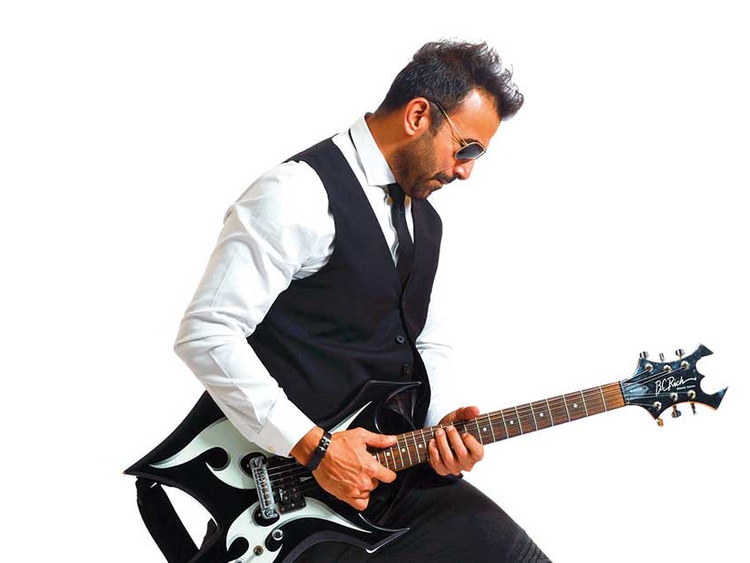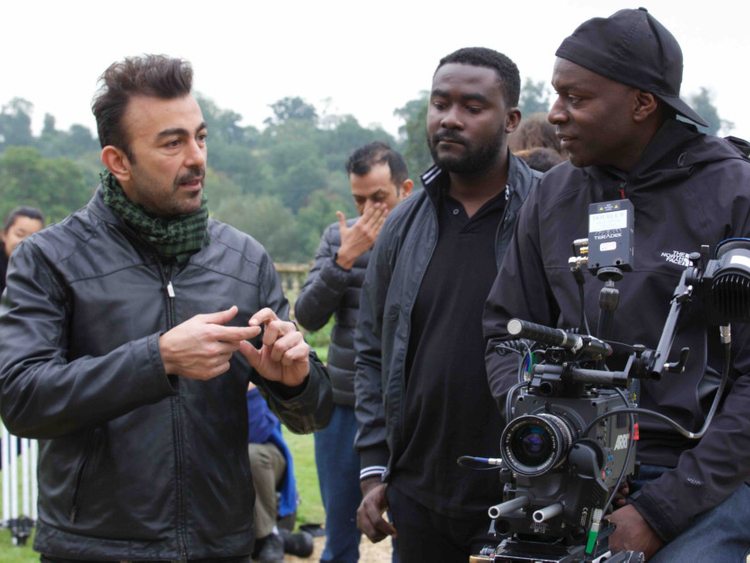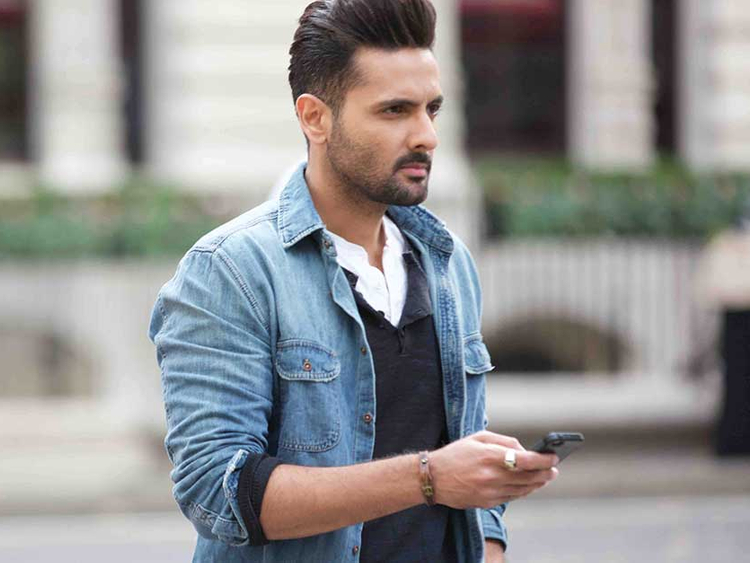There are movie remakes that do not pretend to match the greatness of the originals but take their own course. Pakistani actor-director Shaan Shahid’s Arth — The Destination is one such film. It’s an official remake of the award-winning Bollywood classic Arth (1982), directed by Mahesh Bhatt, which is still remembered for the powerful performances by its lead actors Shabana Azmi, Smita Patel, Kulbhushan Kharbanda, and Raj Kiran; a great soundtrack by Jagjit Singh that complemented Kaifi Azmi’s evocative lyrics; and its hauntingly simple yet gripping plotline.
The Pakistani version is supposed to be high on glamour. Besides, it professes to a few odd changes here and there. But Shahid and his cast members — Bol-famed Humaima Malik, and noted TV actors Mohib Mirza and Uzma Hasan — swear the film stays loyal to the original’s emotional core. Despite the stylish flourishes, it remains an intense tale of infidelity, obsession in love, remorse and self-realisation.
As the film hits theatres across the UAE this weekend, Gulf News tabloid! spoke with its lead stars. Excerpts follow:
SHAAN SHAHID
Reimagines the simple, small-time club singer Raj from the original Arth, as a has-been rockstar with a designer tattoo, a divorcee with a heart of gold, who is ready to take a second shot at life
Why did you choose to remake Arth, in the first place?
I personally feel it’s a very important film in the Indian cinema history — it broke a lot of taboos for its time, and created a whole new genre. Besides, of course, it’s a beautiful storyline.
How faithful is your reimagining of the original?
Well, I tweaked its screenplay and characters a bit. I mean, there’s no point in trying to make a classic again. As the writer also, I took the liberty to add things here and there without losing the essence of Mahesh Bhatt’s film. For instance, I changed the protagonist but it remains female-centric. The best part about screenplay writing is that you can create another timeline within the same timeline. So, whatever was happening at that time in Bhatt saheb’s story, I opted to leave that and went towards this small-time singer’s character [originally played by Raj Kiran]. Who’s that guy? Where did he come from? Things like that.
What about the music of the film? The Mahesh Bhatt film had a memorable soundtrack by Jagjit Singh.
We have Sahir Ali Bagga who’s created some amazing music. I’m not saying this because it’s my film. The two Rahat Fateh Ali Khan numbers [Murshed ji and Sanwar de Khudaya] are a rage already. There’s one song in the original Arth, Tum Itna Jo Muskura Rahe Ho, which I wanted to use. So, we approached Sa Ra Ga Ma, which is supposed to be an independent company, for music rights. But they gave us a lot of trouble. Eventually, I gave up the idea.
You earlier said in a press conference that you “took this film as an opportunity to strengthen the film trade between countries [of India and Pakistan].” Care to elaborate?
Yes, the most important reason for me to pick up an Indian film was trade. Over the past decade, Bollywood movies have enjoyed a fair opportunity to come to Pakistan, get released in theatres here, and make money. That’s absolutely fine. In fact, there are 324-odd items that we import from India everyday — from bananas to tomatoes. Whenever the government decides, they can have the kabaddi competitions also, but nothing related to performing arts. I feel bad when our films are not allowed in India, and especially a film which is a remake of an Indian classic. Why can’t we leave politics out of films? I believe India could have played a key role in all this, especially considering how they are expanding their cultural wings across the world. They have a great market here, while our spending power as a nation is more. If they wanted, they could’ve set up film academies and invested in Pakistan’s entertainment sector, so that our youth which India dubs as ‘fundos’ would move into liberal arts and steer away from the kind of fundamentalism that they are so against.
‘Arth’ is a Sanskrit word. Why didn’t you change it as the film’s title?
Considering the number of Bollywood films that are consumed in Pakistan, you should expect us to understand at least a few Hindi words well. [Chuckles.]
Have you received any feedback from Mahesh Bhatt?
Oh yes, he’s very happy. He’s seen the trailers and the videos, and liked them. He’s also kind enough to support us with his words.
Bhatt’s Arth was hailed for its ingenuity and simplicity, among other things. In contrast, your film looks too lavish and glamorous. Comment.
I think if Bhatt sahib [sir] had a lot of money back then, he’d also have made a more lavish and glamorous film.
What is the budget of your film?
Almost 10 crore Pak rupees.
How much time did you take on this film?
Two years, because I was shooting another film simultaneously.
HUMAIMA MALIK
Injects the love-obsessed, schizophrenic actress Kavita (in the original) with dollops of glamour and the tag of a “superstar”.
How was it like stepping into the shoes of the legendary [late] Smita Patil? Were you intimidated or apprehensive?
You know, when I did Bol, back in 2011, an article came out in India that called me “The Pakistani Smita Patel,” because I didn’t use glycerine and cry very naturally, etc. That had left me a little scared. Much later, when I was offered this role [in Arth — The Destination], I got worried that comparison would be drawn [again]. I don’t consider myself anywhere close to her [Patil] in terms of how she carried off that part in her time. I thought, if I don’t do it well and missed out on the nuances of the character she had embodied so ably, I would not be doing justice to myself. So, I took it as a challenge. Also, the trust and push that I got from my director [Shaan Shahid] was amazing.
Is there something about the original film that you wish had been retained as it is?
I don’t think I have such a big scale of talent in me to comment on this. Besides, [movies that are classics] cannot be remade in the same way. These are different times that we are breathing in, and we are a different bunch of actors. We have retained the core of the film, and I think that’s quite fair.
UZMA HASAN
Reprises Shabana Azmi’s immensely graceful housewife Pooja who is awakened into self-realisation by her husband’s infidelity.
The character you’re playing in the film was originally essayed by the celebrated Indian actress Shabana Azmi, who went on to win the Indian National Award for her performance. Do you feel weighed down by the comparisons that are going to be made inevitably?
It’s a huge burden, yes, because you are going to be compared to the legendary Shabana Azmi. She is one of my favourite actresses, and this film was one of my favourites growing up. As actors, we are always learning; that’s a lifelong process. So, you should be ready to take criticism and whatever the audiences say in a positive way. I hope it’s good, but even if it isn’t, I’ll take that opportunity to fix my craft, and make it better for the future.
Mahesh Bhatt’s Arth was a woman-oriented subject. Shaan Shahid’s Arth seems to revolve around his character. What do you have to say about that?
As far as my own work is concerned, I know that it’s an extremely important character in the film. We’ve taken the basic plot — but that was 1982, and this is 2017. Besides, that was India, this is Pakistan. So, there are things that are different, but the basic storyline is the same — it’s about a second shot at life. When you think that all the opportunities have ended and doors have closed for you, you may never know what will come round the corner. So, by that account, it focuses on the characters played by Shaan and myself, and Humaima and Mohib. The film’s tagline, “Decisions determine destiny,” applies to all four of us.
Is there a character or a situation, or anything about the original film that you wish had been retained as it is?
See, Pakistani cinema is just being set up all over again. Arth was an art film. It needed to be adapted in order for today’s audiences to come to theatres and enjoy watching it. Humaima’s character is larger than life; she plays a diva and is bringing in glamour, style, and stardom. But as far as my character is concerned, there’s nothing over the top, it’s very organic. There are scenes where I haven’t applied any make-up on my face. Because I am a theatre actor, so generally also my take on acting is not glamorous. I am a character actress. I wasn’t worried about the number of scenes or songs I was going to get in the film; I just wanted to do my job right to the best of my ability. And, my job is to convince people so that they can understand and empathise with what my character on screen is going through internally.
Having said that, I believe the essence of the original film is very much there in our product. I don’t think if there was something that could have been done differently, so I’d be more satisfied, because at the end of the day this is a different version and a different take, from a different person’s point of view. I am more than happy with what we’ve done.
MOHIB MIRZA
Repackages Inder Malhotra’s failed filmmaker who is cheating on his doting wife, with designer wardrobe and an attitude to match.
The character you play was originally a very simple-looking, struggling filmmaker. Yours is a very glamorous version. How do you see it?
I believe Arth was a story of relationships, and the essence of the story, the characters, and their complexities are all present in our film as well. It’s just that they’ve been presented according to the demands of the time.
How many times have you seen Mahesh Bhatt’s Arth?
Once. I didn’t want to be too inspired by the performances in the film.
Did you ever fear that the film might focus too much on Shaan’s character which was only a small part in the original?
No, I don’t have such issues. Perhaps I am like that. Secondly, if I sign on a project, I do so after careful deliberation. As a performer, where I stand is what my audiences shall decide. Personally speaking, I only benefited by working with Shaan and observing him — as an actor and as a director. It was a great learning experience. So, whatever the box office result of the film might be, I have gained whatever I have gained from the film.
Do you think contemporarising the film was a good idea?
I can’t comment on that; it’s for the audiences to tell us. My job as an actor is simply to connect the audience with the suffering of the character I am portraying. And if I am able to do that, my job is done.
Don’t miss it
Arth — The Destination releases in the UAE on December 28.














